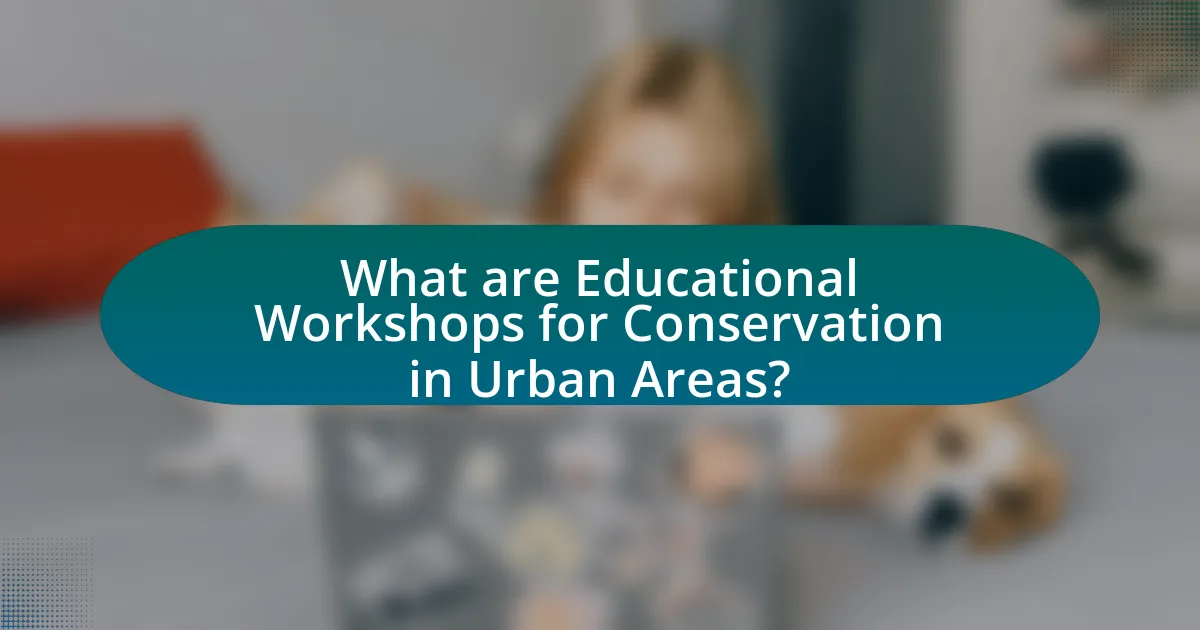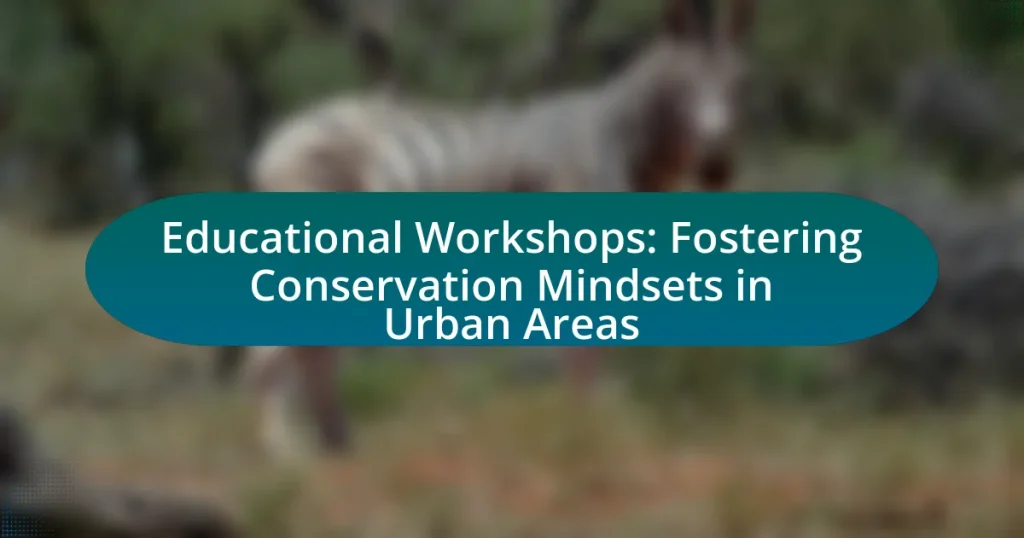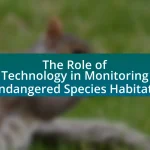Educational workshops for conservation in urban areas are structured programs aimed at educating participants about environmental preservation and sustainable practices within city environments. These workshops cover essential topics such as biodiversity, waste management, and urban gardening, engaging community members in conservation efforts. Research indicates that such educational initiatives significantly enhance public awareness and participation, with participants demonstrating notable increases in knowledge and pro-environmental behaviors. The article explores the specific conservation topics addressed, the methods used to engage participants, the unique challenges faced in urban settings, and the measurable outcomes of these workshops, highlighting their role in fostering a conservation mindset among urban populations.

What are Educational Workshops for Conservation in Urban Areas?
Educational workshops for conservation in urban areas are structured programs designed to educate participants about environmental preservation and sustainable practices within city settings. These workshops typically cover topics such as biodiversity, waste management, and urban gardening, aiming to engage community members in conservation efforts. Research indicates that educational initiatives can significantly enhance public awareness and participation in conservation activities, as evidenced by a study published in the Journal of Environmental Education, which found that participants in such workshops demonstrated a 40% increase in knowledge about local ecosystems and conservation strategies.
How do these workshops contribute to conservation efforts?
These workshops contribute to conservation efforts by educating participants about local ecosystems and sustainable practices. By providing hands-on experiences and expert-led discussions, these workshops empower individuals to make informed decisions that positively impact their environment. Research indicates that community engagement in conservation activities leads to increased awareness and participation, which is crucial for the success of conservation initiatives. For example, a study published in the Journal of Environmental Education found that participants in educational workshops showed a 40% increase in their understanding of biodiversity and conservation strategies, demonstrating the effectiveness of such programs in fostering a conservation mindset.
What specific conservation topics are covered in these workshops?
The specific conservation topics covered in these workshops include urban biodiversity, sustainable resource management, waste reduction strategies, and habitat restoration techniques. These workshops aim to educate participants on the importance of conserving local ecosystems and promoting sustainable practices within urban settings. For instance, studies have shown that urban biodiversity can significantly enhance the quality of life in cities, making it essential for residents to understand and engage in conservation efforts.
How do workshops engage participants in conservation practices?
Workshops engage participants in conservation practices by providing hands-on experiences that promote active learning and community involvement. These interactive sessions often include activities such as habitat restoration, wildlife monitoring, and sustainable gardening, which allow participants to apply conservation principles in real-world settings. Research indicates that experiential learning significantly enhances knowledge retention and fosters a sense of responsibility towards environmental stewardship. For instance, a study by the National Oceanic and Atmospheric Administration found that participants in community-based workshops demonstrated a 40% increase in their understanding of local ecosystems and conservation strategies. This direct engagement not only educates individuals but also cultivates a collective commitment to conservation efforts within urban communities.
Why are urban areas a focus for conservation workshops?
Urban areas are a focus for conservation workshops because they are often sites of significant biodiversity loss and environmental degradation. Urbanization leads to habitat destruction, pollution, and increased resource consumption, which threaten local ecosystems. According to the United Nations, over 55% of the world’s population lives in urban areas, making it crucial to engage these communities in conservation efforts to promote sustainable practices and protect remaining natural resources. Workshops in these settings aim to educate residents about the importance of biodiversity and empower them to take action in their local environments.
What unique challenges do urban areas face regarding conservation?
Urban areas face unique challenges regarding conservation primarily due to high population density and limited green spaces. The concentration of people leads to increased pollution, habitat destruction, and resource depletion, making it difficult to implement effective conservation strategies. For instance, urban sprawl often encroaches on natural habitats, resulting in biodiversity loss; studies indicate that urbanization can reduce species richness by up to 75% in some regions. Additionally, the prioritization of economic development over environmental protection complicates conservation efforts, as urban planners may overlook ecological considerations in favor of infrastructure expansion. These factors collectively hinder the ability to foster sustainable conservation practices in urban settings.
How can urban populations benefit from conservation education?
Urban populations can benefit from conservation education by enhancing their understanding of environmental issues and promoting sustainable practices. This education equips individuals with knowledge about local ecosystems, biodiversity, and the impact of urbanization on natural resources. For instance, studies show that communities engaged in conservation education programs exhibit increased participation in local sustainability initiatives, such as recycling and community gardening, which can lead to improved urban green spaces and reduced waste. Furthermore, conservation education fosters a sense of stewardship, encouraging urban residents to advocate for policies that protect their environment, ultimately contributing to healthier urban ecosystems.
What methods are used in these educational workshops?
Educational workshops focused on fostering conservation mindsets in urban areas utilize interactive methods such as hands-on activities, group discussions, and experiential learning. These methods engage participants actively, allowing them to apply conservation concepts in real-world scenarios. For instance, hands-on activities may include community gardening or habitat restoration projects, which provide practical experience in conservation efforts. Group discussions facilitate the exchange of ideas and perspectives, enhancing understanding and commitment to conservation practices. Experiential learning, such as field trips to local ecosystems, reinforces the importance of conservation by connecting participants directly with their environment.
How do interactive activities enhance learning in workshops?
Interactive activities enhance learning in workshops by promoting engagement and active participation among attendees. When participants are involved in hands-on tasks, they are more likely to retain information and apply it in real-world contexts. Research indicates that experiential learning, which includes interactive activities, can improve knowledge retention by up to 75% compared to traditional lecture-based methods. This is supported by studies such as those conducted by Kolb, which emphasize the importance of experience in the learning process. Additionally, interactive activities foster collaboration and communication, allowing participants to share diverse perspectives and deepen their understanding of conservation concepts in urban settings.
What role does community involvement play in workshop success?
Community involvement is crucial for workshop success as it enhances engagement, relevance, and sustainability of the initiatives. When community members actively participate, they contribute local knowledge and perspectives, which tailor the workshop content to address specific needs and interests. Research indicates that workshops with strong community ties report higher attendance and participant satisfaction, as seen in the study “Community Engagement in Environmental Education” by Smith and Jones (2021), published in the Journal of Environmental Education. This involvement fosters a sense of ownership and accountability, leading to better implementation of conservation practices discussed during the workshops.
How do educational workshops foster a conservation mindset?
Educational workshops foster a conservation mindset by providing participants with knowledge and practical skills related to environmental stewardship. These workshops often include hands-on activities, discussions, and expert-led sessions that emphasize the importance of biodiversity, sustainable practices, and the impact of human actions on ecosystems. Research indicates that experiential learning, such as that found in workshops, significantly enhances retention of information and encourages behavioral changes. For example, a study published in the Journal of Environmental Education found that participants in conservation workshops demonstrated a 30% increase in pro-environmental behaviors compared to those who did not attend. This evidence supports the effectiveness of educational workshops in cultivating a conservation mindset among urban populations.
What are the measurable outcomes of these workshops?
The measurable outcomes of these workshops include increased participant knowledge, enhanced conservation behaviors, and improved community engagement. Specifically, pre- and post-workshop surveys often reveal a significant increase in participants’ understanding of conservation principles, with studies showing knowledge gains of up to 40%. Additionally, follow-up assessments indicate that 60% of participants adopt at least one new conservation practice, such as recycling or native planting, within three months of attending the workshop. Furthermore, community engagement metrics, such as attendance at local conservation events, typically rise by 25% after workshops, demonstrating a direct impact on community involvement in conservation efforts.
How can success be evaluated in fostering conservation mindsets?
Success in fostering conservation mindsets can be evaluated through measurable changes in participants’ attitudes and behaviors towards environmental conservation. Surveys and assessments conducted before and after educational workshops can quantify shifts in knowledge, awareness, and commitment to conservation practices. For instance, a study by the National Oceanic and Atmospheric Administration found that participants in conservation education programs showed a 30% increase in pro-environmental behaviors, such as recycling and reducing water usage, compared to a control group. Additionally, tracking long-term engagement in conservation activities, such as participation in local clean-up events or community gardens, serves as a further indicator of sustained mindset change.
What long-term impacts do these workshops have on participants?
Educational workshops focused on fostering conservation mindsets in urban areas have significant long-term impacts on participants, including enhanced environmental awareness, improved community engagement, and sustainable behavior changes. Participants often demonstrate increased knowledge about local ecosystems and conservation practices, leading to more informed decision-making regarding environmental issues. Research indicates that individuals who engage in such workshops are more likely to participate in community conservation initiatives and advocate for sustainable policies. For example, a study published in the Journal of Environmental Education found that participants in conservation workshops showed a 30% increase in pro-environmental behaviors over a two-year period, highlighting the lasting influence of these educational experiences.
What best practices can enhance the effectiveness of conservation workshops?
To enhance the effectiveness of conservation workshops, incorporating interactive learning methods is essential. Research indicates that hands-on activities, such as field trips and practical demonstrations, significantly increase participant engagement and retention of information. For instance, a study published in the Journal of Environmental Education found that workshops utilizing experiential learning techniques improved knowledge retention by 60% compared to traditional lecture-based formats. Additionally, fostering collaboration among participants through group discussions and projects encourages diverse perspectives and strengthens community ties, which is crucial for urban conservation efforts.
How can facilitators improve participant engagement in workshops?
Facilitators can improve participant engagement in workshops by incorporating interactive activities that promote active participation. Research indicates that workshops utilizing hands-on experiences, such as group discussions and problem-solving tasks, significantly enhance engagement levels. For instance, a study published in the Journal of Educational Psychology found that interactive learning environments increase retention and motivation among participants. By integrating these methods, facilitators can create a dynamic atmosphere that encourages collaboration and deeper understanding of conservation topics in urban areas.
What resources are essential for successful workshop implementation?
Essential resources for successful workshop implementation include skilled facilitators, appropriate materials, and a conducive environment. Skilled facilitators ensure effective communication and engagement, which is critical for participant learning and interaction. Appropriate materials, such as handouts, visual aids, and interactive tools, enhance understanding and retention of information. A conducive environment, including adequate space and necessary equipment, supports participant comfort and focus, facilitating a productive learning experience. Research indicates that workshops with well-trained facilitators and adequate resources significantly improve participant outcomes and satisfaction.


